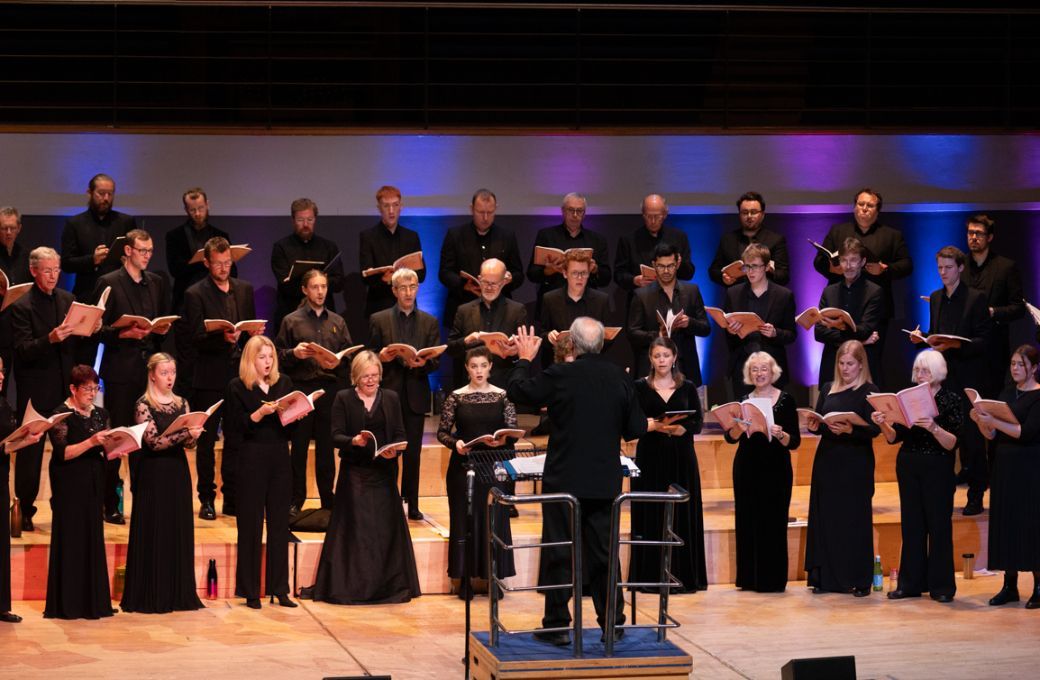Concerts given by Ex Cathedra are never just concerts. One of the most compelling aspects of their performances – aside from the actual singing – is the way they apply scholarship and historical understanding to the presentation of the music. At Easter this year, they turned Bach’s St Matthew Passion into something akin to a liturgy, and while yesterday afternoon’s concert of Rachmaninov’s Vespers was more low-key, the effect was broadly similar.

To enhance the performance, conductor Jeffrey Skidmore had created a sequence of seven “Bell Preludes”, comprising tubular bells and crotales, that were interpolated between the movements of the Vespers. Performed off-stage by Simone Rebello, these proved to be much more than mere interludes. With a simplicity redolent of, and at times directly invoking, religious chant, from the outset these preludes established a heightened atmosphere, with more than a whiff of ritual, providing an entirely fitting context for the Rachmaninov. It’s to Skidmore’s credit that these preludes were both short and plain (at times also resembling a cypher, as if something tangible had been codified into bells), in no way detracting from the primary focus on the voices.
Large scale sacred works – particularly those rooted in some form of orthodoxy – can so easily become dry exercises in pseudo-pious, strictly limited chord progressions. Ex Cathedra obviated this through a palpable sense of focus, coupled to an approach that made each new section distinct from its neighbours. Blagoslovi dushe moya was articulated with a hushed tone of reverence – mezzo Martha McLorinan skilfully managing to project while also maintaining this attitude – culminating in a beautifully polarised music, the upper voices suggesting elation, the lower profundity. Blazhen muzh was kept simple, allowing its scale patterns to lilt, while Nyne otpushchayeshi (Blessed in the Man), featuring tenor Peter Davoren, created the impression of a softly shining brightness, nicely conveying vestiges of both cause and intensity of the fulfilment spoken of in the text, wrapped in an atmosphere of deep peace.
Skidmore also made the most of the opportunities when Rachmaninov strays as far as he dared from the strictures of Orthodox convention. He took Khvalite imya Gospodne (Praise the Name of the Lord) at a surprisingly brisk pace, a complete transformation from the weighty seriousness that had gone before. Now the singers were as light as air, practically dancing along, while the sopranos flowed quickly overhead. Likewise the contrast from Dnes spaseniye to Voskres iz groba, the former a gentle lullaby, followed by an explosion of triumphal outbursts alternating with short reflections.
It was interesting to note in episodes like these, where Ex Cathedra were at their most energetic, that the dry acoustic of Birmingham Town Hall, which had seemed a possible liability earlier on, worked here and elsewhere to strengthen our connection to the singers, both as a group and individually, as opposed to being distanced from them through a reverberant fug. Whatever you may think about the veracity of the texts, this aspect felt utterly direct and authentic.
Even when Rachmaninov’s music occasionally began to sound a touch repetitive (most noticeable in the longer sequences), Skidmore prevented it from becoming generic through strong dynamic and dramatic contours. The lengthy setting of the Magnificat, Velichit dusha moya Gospoda (My Soul Doth Magnify the Lord), featured a palpable flexing of intensity, touching on exquisite moments of intimate tenderness. It was in these longer tracts that one become aware of perhaps the most remarkable thing about Ex Cathedra’s performance: their incredible intonation and tuning, soaring to great heights and plunging into abyssal depths yet staying true, never wavering. The choir’s intricate shaping of the music continued to the last, Vzbrannoy voyevode passing through blazing fire before finally receding into a quiet, radiant joy.


